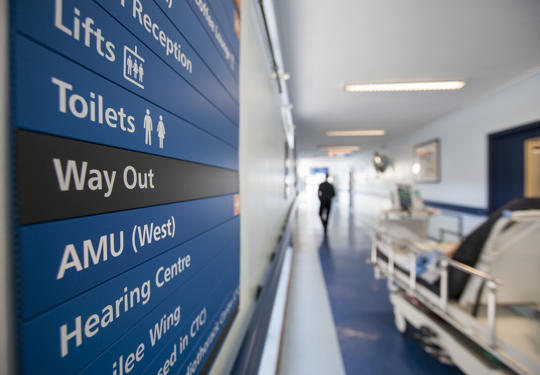In this month’s blog, Dr Hilary Williams, RCP vice president for Wales discusses the findings of the King’s Fund independent learning review, corridor care and the importance of respectful, professional debate.
I’m sad to say that corridor care appears to have become a permanent feature in hospitals in Wales. Earlier this summer, our colleagues at the Royal College of Nursing published a really excellent report about this, and they have now invited me to join them at a roundtable to discuss solutions. It’s really easy to feel helpless when you’re caught up in the middle of it all, so, in preparation, I spoke to some colleagues across Wales to gather ideas.
Everyone, from medical registrars to senior nurses, told me that corridor care should be a ‘never event’. Renaming it ‘boarding’ or ‘chair care’ – or, indeed, anything else – is not acceptable. Hiding the numbers behind a different name is not acceptable.
Dr Chris Subbe, a quality improvement specialist and acute care physician based in north Wales, told me: ‘We need to optimise bed management, minimise moving our patients, optimise doctor rotations to increase the continuity and efficiency of wards, and avoid having a different doctor every day’.
From early career physicians, I heard that doctors at all grades and career stages are continually moving around, causing handover risks, reducing autonomy and decision-making capabilities, and leading to a lack of oversight for the patient journey.
Clinicians are leading service change. There are so many great examples, but learning about the integration of acute and community care in Hywel Dda University Health Board during our recent Cyswllt visit was a standout for me. There’s lots to learn from the frailty service in Withybush too.
I’m hopeful that Health Education and Improvement Wales is listening. We are committed to working together to find practical ways to support training and develop a sustainable and highly skilled workforce for our smaller hospitals in rural Wales.
I keep thinking about all the teams trying to help frail and sick patients who are sitting in chairs, cupboards and corridors in hospitals in Wales right now. How can we talk about ‘what matters’ and help patients to make some of the most important choices they’ll ever face in the last weeks of their lives if their clinical care is limited to a corridor?
Only this month, Marie Curie published a report which found that access to high-quality palliative and end-of-life care is patchy, inconsistent and inequitable. (You can read the RCP response here.) This report felt very real and the voices of patients and families resonated with me all too clearly.
Rebuilding trust with our members
The King’s Fund independent learning review into the events surrounding the RCP’s extraordinary general meeting on the role of physician associates has now been published. It makes sobering reading and we have accepted the findings and recommendations in full.
Over the past few years, the RCP has let down its members. I am absolutely sure that we can develop and grow into a more agile, transparent, modern organisation. But it will require serious teamwork, hard graft and commitment. Quick fixes and quick wins are not enough.
Already we have heard that RCP Council is returning to its rightful place as a positive forum for respectful, professional debate. The college is beginning to feel more inclusive, seeking out the views and concerns of a wider range of members, from our senior fellows to newly qualified doctors. I am proud of how connected we are with each other in Wales, and I hope that we can share our learning with other parts of the college.
And finally …
It was a hectic week at the RCP, but one of my favourite moments was spending time with some wonderful older fellows. I was deeply impressed by the Samuel Gee lecture at this year’s annual general meeting. Professor Catherine Mummery, professor of neurology at University College London, talked about ‘A new era in Alzheimer’s disease – translating hope into impact’. The discussion afterwards was superb. Isn’t this exactly what we should be doing at the RCP: hosting valuable, challenging and expert debate?
Look after yourselves.






